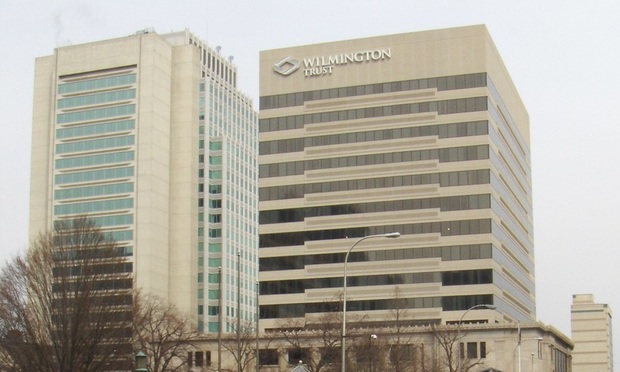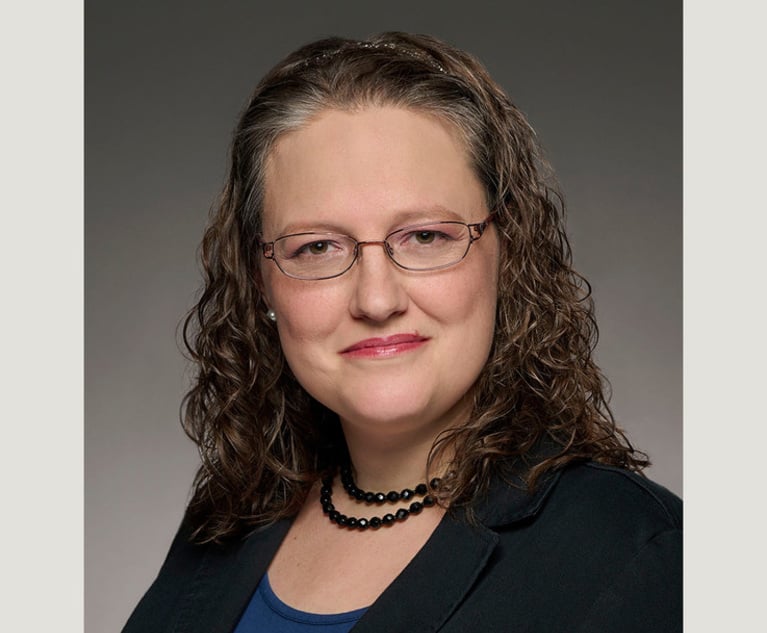2 Former Wilmington Trust Execs Sentenced to 6 Years for Fraud
Robert V.A. Harra, Wilmington Trust's former president, and David Gibson, who served as the bank's chief financial officer, were the first of four defendants to be sentenced this week after a federal jury convicted them of multiple crimes stemming from the bank's downfall in 2011.
December 17, 2018 at 05:55 PM
4 minute read
The original version of this story was published on Delaware Law Weekly
 Wilmington Trust headquarters. Photo: RevelationDirect/Wikimedia Commons
Wilmington Trust headquarters. Photo: RevelationDirect/Wikimedia Commons
Two of Wilmington Trust's former top executives were each sentenced to six years in prison Monday for their roles in a massive reporting scandal that hid hundreds of millions of dollars in bad loans from regulators and investors, leading to the bank's collapse.
Robert V.A. Harra, Wilmington Trust's former president, and David Gibson, who served as the bank's chief financial officer, were the first of four defendants to be sentenced this week by U.S. District Judge Richard G. Andrews, after a federal jury convicted them of multiple crimes stemming from the bank's downfall in 2011.
Both men received fines of $300,000 and are expected to turn themselves in to federal custody Feb. 19, pending an appeal. Two other executives, William North and Kevyn N. Rakowski, were scheduled to appear for sentencing Wednesday, an attorney for Harra said.
“It's a sad day for me, and it just breaks my heart … because he's the most honorable man I ever met,” Harra's attorney, Michael P. Kelly, said of his client. “It hurts my heart that he's being sentenced to prison, and I look forward to the appeal.”
In May, Harra, Gibson, North and Rakowski were convicted on 15 counts of fraud and conspiracy for failing to report the amount of toxic and past-due loans on Wilmington Trust's books between October 2009 and November 2010. At the time, North and Rakowski served as Wilmington Trust's chief credit officer and controller, respectively.
Gibson was convicted on three additional counts of making false certifications in financial reports. His attorney, Kenneth M. Breen said Monday that, “We are planning to of course appeal this sentencing decision.”
The U.S. Attorney's Office for the District of Delaware, which brought charges in 2015, said Monday that the downfall of Wilmington Trust was a “tragedy” for the bank's former employees and investors.
In a statement, U.S. Attorney David C. Weiss blamed Harra for an “aggressive sales culture that ignored sound risk assessment in commercial real estate lending.” He said that Gibson for years certified the bank's financials as accurate, despite knowing the true nature of its portfolio.
“These actions do not define defendants' lives. As you've heard, they were successful and productive both professionally and personally,” Weiss said in the statement. “But, they did violate the law. They committed serious federal crimes and failed in their responsibilities to the bank, its employees and shareholders. Justice demands accountability. ”
According to the 2015 indictment, Wilmington Trust avoided mandatory disclosures to the U.S. Securities and Exchange Commission and the Federal Reserve Bank by “waiving” matured loans from the reporting requirements for past due loans.
Prosecutors said that by the end of 2009, the bank reported just $10.8 million of the $344.2 million in commercial real estate loans that were past due by 90 days or more, giving investors and regulators a false impression of the Delaware financial institution's health. Under pressure to eliminate the past due and matured loans, the executives hatched a plan to “mass-extend” more than 800 commercial loans worth around $1.3 billion.
Once the public learned the scope of the toxic loans, Wilmington Trust was purchased in a fire sale by M&T Bank in November 2010 for just $3.84 per share—about $9.41 per share less than its value when the bank raised $273.9 million in a public offering nine months prior, according to the indictment.
Wilmington Trust's former chairman and CEO Ted Cecala was never charged, but the bank itself became the first financial institution to face criminal charges in connection with the federal government's Troubled Asset Relief Program, or TARP.
Prosecutors had lobbied for a sentence of eight years for Harra, but Kelly, chairman of McCarter & English, asked Andrews to hand down a sentence of probation, which would have allowed Harra to stay out of prison and continue his charitable work.
He said Harra was not in good health and had been made a scapegoat for the bank's decline.
“He's lost a lot, but we'll see what happens,” Kelly said. “I'm confident we will win on appeal.”
This content has been archived. It is available through our partners, LexisNexis® and Bloomberg Law.
To view this content, please continue to their sites.
Not a Lexis Subscriber?
Subscribe Now
Not a Bloomberg Law Subscriber?
Subscribe Now
NOT FOR REPRINT
© 2025 ALM Global, LLC, All Rights Reserved. Request academic re-use from www.copyright.com. All other uses, submit a request to [email protected]. For more information visit Asset & Logo Licensing.
You Might Like
View All

Here's What Corporate Litigators Expect Delaware Courts to Address in 2025
6 minute read
Tesla, Musk Appeal Chancery Compensation Case to Delaware Supreme Court
2 minute read
Fed Judiciary Panel Mulls Authority to Ban In-State Bar Admission Requirements
Trending Stories
- 1'Not the President's Personal Lawyer': Lawyers Share Concerns Over How AG Pick Bondi’s Loyalism to Trump May Impact DOJ
- 2US Judge OKs Partial Release of Ex-Special Counsel's Final Report in Election Case
- 3The Demise of Truth and Transparency in Federal Sentencing
- 4Former Phila. Solicitor Sozi Tulante Rejoins Dechert
- 5'I've Seen Terrible Things': Lawyer Predicts Spike in Hazing Suits
Who Got The Work
Michael G. Bongiorno, Andrew Scott Dulberg and Elizabeth E. Driscoll from Wilmer Cutler Pickering Hale and Dorr have stepped in to represent Symbotic Inc., an A.I.-enabled technology platform that focuses on increasing supply chain efficiency, and other defendants in a pending shareholder derivative lawsuit. The case, filed Oct. 2 in Massachusetts District Court by the Brown Law Firm on behalf of Stephen Austen, accuses certain officers and directors of misleading investors in regard to Symbotic's potential for margin growth by failing to disclose that the company was not equipped to timely deploy its systems or manage expenses through project delays. The case, assigned to U.S. District Judge Nathaniel M. Gorton, is 1:24-cv-12522, Austen v. Cohen et al.
Who Got The Work
Edmund Polubinski and Marie Killmond of Davis Polk & Wardwell have entered appearances for data platform software development company MongoDB and other defendants in a pending shareholder derivative lawsuit. The action, filed Oct. 7 in New York Southern District Court by the Brown Law Firm, accuses the company's directors and/or officers of falsely expressing confidence in the company’s restructuring of its sales incentive plan and downplaying the severity of decreases in its upfront commitments. The case is 1:24-cv-07594, Roy v. Ittycheria et al.
Who Got The Work
Amy O. Bruchs and Kurt F. Ellison of Michael Best & Friedrich have entered appearances for Epic Systems Corp. in a pending employment discrimination lawsuit. The suit was filed Sept. 7 in Wisconsin Western District Court by Levine Eisberner LLC and Siri & Glimstad on behalf of a project manager who claims that he was wrongfully terminated after applying for a religious exemption to the defendant's COVID-19 vaccine mandate. The case, assigned to U.S. Magistrate Judge Anita Marie Boor, is 3:24-cv-00630, Secker, Nathan v. Epic Systems Corporation.
Who Got The Work
David X. Sullivan, Thomas J. Finn and Gregory A. Hall from McCarter & English have entered appearances for Sunrun Installation Services in a pending civil rights lawsuit. The complaint was filed Sept. 4 in Connecticut District Court by attorney Robert M. Berke on behalf of former employee George Edward Steins, who was arrested and charged with employing an unregistered home improvement salesperson. The complaint alleges that had Sunrun informed the Connecticut Department of Consumer Protection that the plaintiff's employment had ended in 2017 and that he no longer held Sunrun's home improvement contractor license, he would not have been hit with charges, which were dismissed in May 2024. The case, assigned to U.S. District Judge Jeffrey A. Meyer, is 3:24-cv-01423, Steins v. Sunrun, Inc. et al.
Who Got The Work
Greenberg Traurig shareholder Joshua L. Raskin has entered an appearance for boohoo.com UK Ltd. in a pending patent infringement lawsuit. The suit, filed Sept. 3 in Texas Eastern District Court by Rozier Hardt McDonough on behalf of Alto Dynamics, asserts five patents related to an online shopping platform. The case, assigned to U.S. District Judge Rodney Gilstrap, is 2:24-cv-00719, Alto Dynamics, LLC v. boohoo.com UK Limited.
Featured Firms
Law Offices of Gary Martin Hays & Associates, P.C.
(470) 294-1674
Law Offices of Mark E. Salomone
(857) 444-6468
Smith & Hassler
(713) 739-1250






